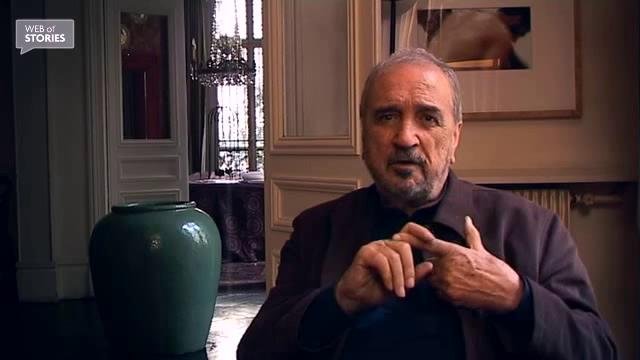NEXT STORY

Working as the colonel’s secretary
RELATED STORIES

NEXT STORY

Working as the colonel’s secretary
RELATED STORIES


|
Views | Duration | |
|---|---|---|---|
| 11. Each country writes history its own way | 2 | 124 | 02:31 |
| 12. Military experience in Algeria | 117 | 01:40 | |
| 13. Algeria’s past | 98 | 01:52 | |
| 14. 'It Was War' | 96 | 01:33 | |
| 15. Working as the colonel’s secretary | 86 | 01:14 | |
| 16. My life inclined towards films | 113 | 03:33 | |
| 17. Jacques Tati picked me | 1 | 175 | 03:39 |
| 18. Observations in the rain | 1 | 149 | 01:06 |
| 19. What I learned from Tati | 2 | 166 | 01:24 |
| 20. Quest for the ideal sound effect | 135 | 02:05 |


Il y avait deux scénaristes, l’un étant moi et l’autre étant un très grand chef de la résistance algérienne de la guerre d’Indépendance, le commandant Azzedine, nous sommes devenus très amis, et il y a deux réalisateurs; un, Ahmed Rahedi, algérien, l’autre Maurice Failevic français, qui avait fait comme moi la guerre. Et nous avons décidé de faire un film, qui est assez long; il dure plus de trois heures en deux époques, qui racontait très simplement un village algérien… convoité par les troupes française et par les troupes algériennes, par les combattants algériens. Quelles méthodes emploient-ils, d’un coté comme de l’autre, pour conquérir ce village? Pour le conquérir, non seulement physiquement, mais… spirituellement, si on peut dire, moralement. Et le film était très passionnant, il a eu beaucoup de prix. Il a été tourné juste avant le début des massacres en Algérie dans le sud, dans le région Boussaada, bien sûr j’y suis allé́ et retourné souvent, et je crois que maintenant ce serait peut-être impossible de le refaire. Ce serait en tout cas beaucoup plus difficile. Mais c’était une expérience fascinante. Donc finalement de ce séjour apparemment inutile, ennuyeux au possible et même désagréable, il est resté ce film, ce livre… il m’est resté quelque chose, donc on ne peut jamais dire… personne ne peut jamais dire, ce qu’il garde de tel ou tel moment de sa vie… ce que sa vie lui a apporté ou lui a enlevé.
There were two screenwriters, one being me and the other being a highly regarded leader of the Algerian resistance during the war, Commandant Azzedin, and we became close friends. And there were two directors, the first, Ahmed Rahedi – Algerian – and the other Maurice Failevic – French – who had taken part in the war as well. And we decided to make a film, which is quite long, it lasts over three hours, in two stages telling simply the story of an Algerian village, targeted by both French and Algerian troops – Algerian fighters. How did they manage, both one side and the other, to conquer that village? To conquer it not only physically, but also... spiritually, morally even. It was a fascinating film, it won a lot of prizes. It was shot just before the beginning of the killings in Southern Algeria, in the region of Bou-Saada, but of course I went there, and have gone back often, and I believe that now, it would probably be impossible to do it again. It would be at the very least much more difficult. But it was a fascinating experience. So in the end, out of that apparently useless, extremely boring and even uncomfortable stay, I made this film, the book. Something stayed with me, and so you can never say... no one can ever predict what they will retain from one or another moment in their lives, what their life will bring or take away.
French screenwriter Jean-Claude Carrière (1931-2021) began his association with films aged 24 when he was selected by Jacques Tati to write for him. This early experience led to further contact with other film-makers, including Luis Buñuel with whom Carrière collaborated for many years. He wrote screenplays for films including Belle de Jour, The Discreet Charms of the Bourgeoisie, Tin Drum and Danton.
Title: 'It Was War'
Listeners: Andrzej Wolski
Film director and documentary maker, Andrzej Wolski has made around 40 films since 1982 for French television, the BBC, TVP and other TV networks. He specializes in portraits and in historical films. Films that he has directed or written the screenplay for include Kultura, which he co-directed with Agnieszka Holland, and KOR which presents the history of the Worker’s Defence Committee as told by its members. Andrzej Wolski has received many awards for his work, including the UNESCO Grand Prix at the Festival du Film d’Art.
Tags: The Algerian War, Algeria, Bou Saada, It Was War, Maurice Failevic, Ahmed Rahedi, Rabah Zerari
Duration: 1 minute, 33 seconds
Date story recorded: January 2010
Date story went live: 26 July 2010